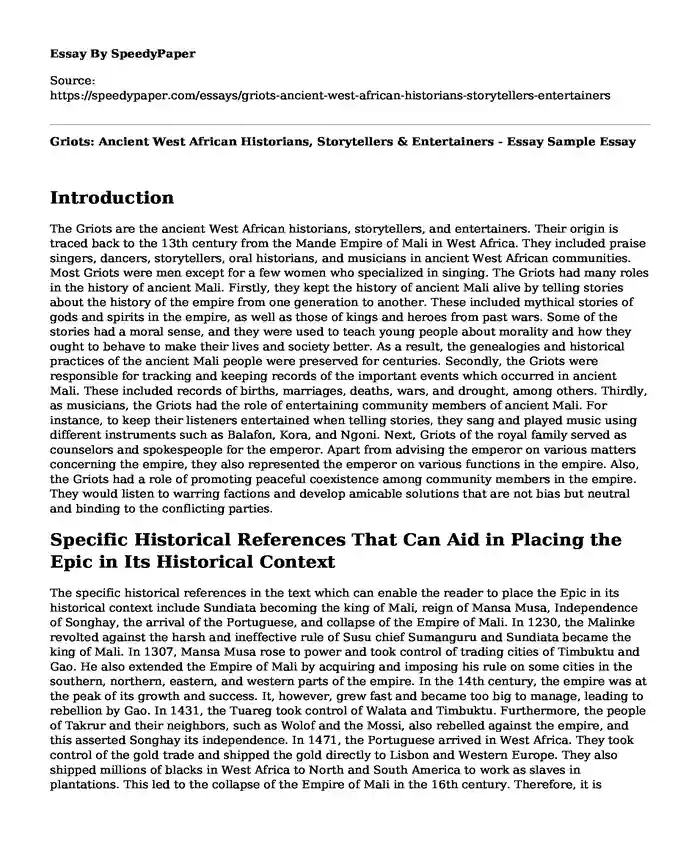
| Type of paper: | Essay |
| Categories: | History Culture World Ancient history |
| Pages: | 3 |
| Wordcount: | 624 words |
Introduction
The Griots are the ancient West African historians, storytellers, and entertainers. Their origin is traced back to the 13th century from the Mande Empire of Mali in West Africa. They included praise singers, dancers, storytellers, oral historians, and musicians in ancient West African communities. Most Griots were men except for a few women who specialized in singing. The Griots had many roles in the history of ancient Mali. Firstly, they kept the history of ancient Mali alive by telling stories about the history of the empire from one generation to another. These included mythical stories of gods and spirits in the empire, as well as those of kings and heroes from past wars. Some of the stories had a moral sense, and they were used to teach young people about morality and how they ought to behave to make their lives and society better. As a result, the genealogies and historical practices of the ancient Mali people were preserved for centuries. Secondly, the Griots were responsible for tracking and keeping records of the important events which occurred in ancient Mali. These included records of births, marriages, deaths, wars, and drought, among others. Thirdly, as musicians, the Griots had the role of entertaining community members of ancient Mali. For instance, to keep their listeners entertained when telling stories, they sang and played music using different instruments such as Balafon, Kora, and Ngoni. Next, Griots of the royal family served as counselors and spokespeople for the emperor. Apart from advising the emperor on various matters concerning the empire, they also represented the emperor on various functions in the empire. Also, the Griots had a role of promoting peaceful coexistence among community members in the empire. They would listen to warring factions and develop amicable solutions that are not bias but neutral and binding to the conflicting parties.
Specific Historical References That Can Aid in Placing the Epic in Its Historical Context
The specific historical references in the text which can enable the reader to place the Epic in its historical context include Sundiata becoming the king of Mali, reign of Mansa Musa, Independence of Songhay, the arrival of the Portuguese, and collapse of the Empire of Mali. In 1230, the Malinke revolted against the harsh and ineffective rule of Susu chief Sumanguru and Sundiata became the king of Mali. In 1307, Mansa Musa rose to power and took control of trading cities of Timbuktu and Gao. He also extended the Empire of Mali by acquiring and imposing his rule on some cities in the southern, northern, eastern, and western parts of the empire. In the 14th century, the empire was at the peak of its growth and success. It, however, grew fast and became too big to manage, leading to rebellion by Gao. In 1431, the Tuareg took control of Walata and Timbuktu. Furthermore, the people of Takrur and their neighbors, such as Wolof and the Mossi, also rebelled against the empire, and this asserted Songhay its independence. In 1471, the Portuguese arrived in West Africa. They took control of the gold trade and shipped the gold directly to Lisbon and Western Europe. They also shipped millions of blacks in West Africa to North and South America to work as slaves in plantations. This led to the collapse of the Empire of Mali in the 16th century. Therefore, it is evident, as discussed above, that the Empire of Mali flourished in the period between the 13th to 16th century and these notable events can enable the reader to place the Epic in its historical context. The historical references discussed in detail allows the reader to understand the Mali Empire in detail from the time of its inception to the time of collapse as noted herein.
Cite this page
Griots: Ancient West African Historians, Storytellers & Entertainers - Essay Sample. (2023, Aug 31). Retrieved from https://speedypaper.net/essays/griots-ancient-west-african-historians-storytellers-entertainers
Request Removal
If you are the original author of this essay and no longer wish to have it published on the SpeedyPaper website, please click below to request its removal:
- Essay Sample in History: Latin American Revolutions
- Essay Sample on Palin's View on America and Americans
- The Great American Debate, Essay Example
- Free Essay on Development Factors of the International Leisure Tourism Demand over the Past 20 Years
- Deductive Reasoning - Article Review Essay Example
- The Idea of Justice and Egalitarianism - Essay Example
- Racial Awareness: Exploring an Individual's Sense of Self in Early American History
Popular categories




